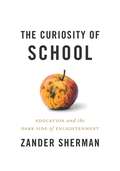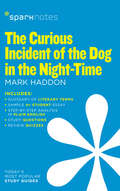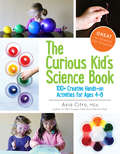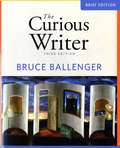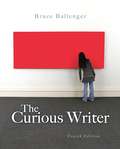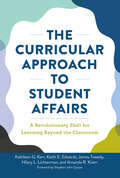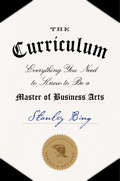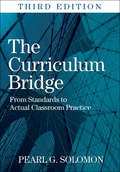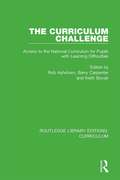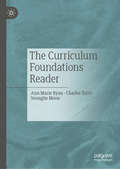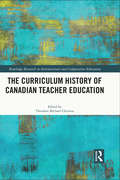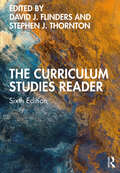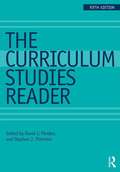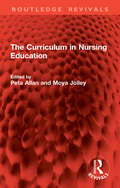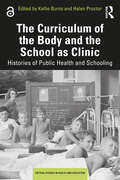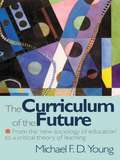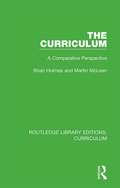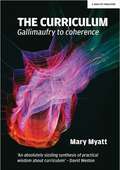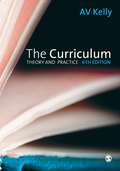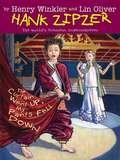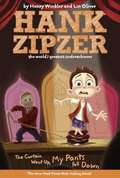- Table View
- List View
The Curiosity of School
by Zander ShermanIt's one thing we all have in common. We've all been to school. But as Zander Sherman shows in this fascinating, often shocking account of institutionalized education, sending your kids off to school was not always normal. In fact, school is a very recent invention. Taking the reader back to 19th-century Prussia, where generals, worried about soldiers' troubling individuality, sought a way to standardize every young man of military age, through to the most controversial debates that swirl around the world about the topic of education today, Sherman tells the often astonishing stories of the men and women-and corporations-that have defined what we have come to think of as both the privilege and the responsibility of being educated. Along the way, we discover that the SAT was invented as an intelligence test designed to allow the state to sterilize "imbeciles," that suicide in the wake of disappointing results in the state university placement exams is the fifth leading cause of death in China, and that commercialized higher education seduces students into debt as cynically as credit card companies do. Provocative, entertaining-and even educational-The Curiosity of School lays bare the forces that shape the institution that shapes all of us.
The Curious Incident of the Dog in the Night-Time (SparkNotes Literature Guide Series #25)
by SparkNotesThe Curious Incident of the Dog in the Night-Time (SparkNotes Literature Guide) by Mark Haddon Making the reading experience fun! When a paper is due, and dreaded exams loom, here's the lit-crit help students need to succeed! SparkNotes Literature Guides make studying smarter, better, and faster. They provide chapter-by-chapter analysis; explanations of key themes, motifs, and symbols; a review quiz; and essay topics. Lively and accessible, SparkNotes is perfect for late-night studying and paper writing. Includes:An A+ Essay—an actual literary essay written about the Spark-ed book—to show students how a paper should be written.16 pages devoted to writing a literary essay including: a glossary of literary termsStep-by-step tutoring on how to write a literary essayA feature on how not to plagiarize
The Curious Kid's Science Book
by Asia CitroWhat happens if you water plants with juice? Where can you find bacteria in your house? Is slug slime as strong as a glue stick? How would your child find the answers to these questions? In The Curious Kid's Science Book, your child will learn to design his or her own science investigations to determine the answers! Children will learn to ask their own scientific questions, discover value in failed experiments, and -- most importantly -- have a blast with science. The 100+ hands-on activities in the book use household items to playfully teach important science, technology, engineering, and math skills. Each creative activity includes age-appropriate explanations and (when possible) real life applications of the concepts covered. Adding science to your at-home schedule will make a positive impact on your child's learning. Just one experiment a week will help build children's confidence and excitement about the sciences, boost success in the classroom, and give them the tools to design and execute their own science fair projects.
The Curious World of Gecko ‘Da Echo: Oh, the Stories We Spin!
by Lowry ChristyHow do geckos and humans meet? What brings them together? What adventures find them? In Oh, the Stories We Spin!, author Christy Lowry takes her readers along as she introduces a semi-tame gecko and a gecko-loving family to each other in Hawaii's Golden Isle. Together gecko and humans go through the ritual of meeting before their barely tame gecko, now sporting a name, polishes off his munch-a-lunch. His munch-a-bunch, is what, pray tell? Just what does he eat?! Not before the reader partly finds out, something spooks him. His sudden and speedy departure through the jungle cuts short their quest. One question still hangs on the hot humid air: Will he, on his own, come home?
The Curious Writer (3rd edition)
by Bruce P. BallengerThe Curious Writer is an assignment-oriented rhetoric-reader that stresses the connections between personal and academic writing. Offering a unique, entertaining, and personal author voice, The Curious Writer is sure to grab the reader's interest and motivates writing. Also distinctive is The Curious Writer's emphasis on inquiry as both a driving force behind the writing process and a method of discovery and learning.
The Curious Writer (Fourth Edition)
by Bruce BallengerThe Curious Writer, an assignment-oriented, all-in-one rhetoric-reader-handbook, stresses the connections between personal and academic writing. The Curious Writer emphasizes inquiry as both a method of discovery and learning and a driving force behind the writing process. The book operates on the principle that writers who begin with questions, rather than answers, achieve better results in their work. It treats research, revision, and critical reading skills (of both texts and visuals) as organic components of every writing process. Each of the eight writing assignment chapters offers integrated coverage of these three key activities and also provides special attention digital tools for invention and research. Offering a unique, entertaining, and personal author voice, The Curious Writer is sure to grab students' interest and motivate them to write.
The Curricular Approach to Student Affairs: A Revolutionary Shift for Learning Beyond the Classroom
by Kathleen G. Kerr Keith E. Edwards James F. Tweedy Hilary Lichterman Amanda R. KnerrThe curricular approach aligns the mission, goals, outcomes, and practices of a student affairs division, unit, or other unit that works to educate students beyond the classroom with those of the institution, and organizes intentional and developmentally sequenced strategies to facilitate student learning. In this book, the authors explain how to implement a curricular approach for educating students beyond the classroom. The book is based on more than a decade of implementing curricular approaches on multiple campuses, contributing to the scholarship on the curricular approach, and helping many campuses design, implement, and assess their student learning efforts. The curricular approach is rooted in scholarship and the connections between what we know about learning, assessment, pedagogy, and student success. For many who have been socialized in a more traditional programming approach, it may feel revolutionary. Yet, it is also obvious because it is straightforward and simple.
The Curriculum
by Stanley BingThe Only Business School You'll Ever NeedFrom the mind of bestselling author Stanley Bing, the ultimate corporate mentor, comes The Curriculum: Everything You Need to Know to Be a Master of Business Arts, a no-nonsense, real-world strategy for success. Sharp, practical, and amusing when it needs to be, and lavishly enhanced with charts, graphs, and other illuminating illustrations, The Curriculum is certain to occupy a place of pride on any shelf dedicated to books that explain how business works, and how that knowledge can be used to achieve power, happiness, and indefensible amounts of money. Included are key chapters on not appearing stupid (mandatory for entry-level students); fabricating a sustainable business personality; management, group dynamics, and the art of selling; self-branding and self-marketing; mastering electronic communications; and dealing with bosses and other crazy people.After contributing thousands of columns to Fortune, Esquire, and the Wall Street Journal, and writing nearly a dozen books on corporate strategy, Stanley Bing is at the top of his game, dispensing a lifetime's worth of hard-won wisdom to the next generation of masters. Enroll in The Curriculum, and his secrets will be yours--along with an attractive diploma, suitable for framing.
The Curriculum Bridge: From Standards to Actual Classroom Practice
by Pearl G. SolomonThis comprehensive resource provides teachers with solid guidelines for choosing standards and designing a curriculum that balances the needs of students with federal mandates.
The Curriculum Challenge: Access to the National Curriculum for Pupils with Learning Difficulties (Routledge Library Editions: Curriculum #1)
by Barry Carpenter Rob Ashdown Keith BovairOriginally published in 1991. The introduction of the National Curriculum has presented many challenges for those concerned with the education of children and young people. One of the questions has been how to guarantee access to the National Curriculum for individuals with special educational needs. This book seeks to illustrate how this could be achieved in the case of those pupils with severe learning difficulties (SLD). In doing so the book offers principles and examples of practice, aiming to be relevant to the education of all pupils with special educational needs (SEN).
The Curriculum Foundations Reader
by Ann Marie Ryan Charles Tocci Seungho MoonThis book brings readers into classrooms and communities to explore critical curriculum issues in the United States throughout the twentieth century by focusing in on the voices of teachers, administrators, students, and families. Framed by an enduring question about curriculum, each chapter begins with an essay briefly reviewing the history of topics such as student resistance, sociopolitical and culturally-centered curricula, curriculum choice, the place and space of curriculum, linguistic policies for sustaining cultural heritages, and grading and assessment. Multiple archival sources follow each essay, which allow readers to directly engage with educators and others in the past. This promotes an in-depth historical analysis of contemporary issues on teaching for social justice in the fields of curriculum studies and curriculum history. As such, this book considers educators in the past—their struggles, successes, and daily work—to help current teachers develop more historically conscious practices in formal and informal education settings.
The Curriculum History of Canadian Teacher Education (Routledge Research in International and Comparative Education)
by Theodore Michael ChristouOrganized by region, this edited collection provides a comprehensive look at how teacher education has evolved regionally and nationally in Canada. Offering an in-depth look at specific provinces and territories, this volume contextualizes the landscape of Canadian public education and the place of teacher education within it. Shedding light on the ways Canadian teacher education was shaped by and in turn influenced its environment, contributors evaluate the current state of education and consider themes, tensions, and historical developments, presenting a view of teacher education that encompasses both its future and its past. A significant contribution to the field of curriculum history, this book offers a benchmark for conversations about the purposes, means, and ends of teacher education in Canada.
The Curriculum Studies Reader
by Stephen J. Thornton David J. FlindersIn this sixth edition of David J. Flinders and Stephen J. Thornton’s ground-breaking anthology, the editors assemble the best in past and present curriculum studies scholarship. From John Dewey’s nineteenth-century creed to Nel Noddings’ provocative call to revive the spirit of the liberal arts, this thoughtful combination of well-recognized and pivotal work provides a complete survey of the discipline, coupled with concrete examples of innovative curriculum and an examination of current topics. New to this edition is a dynamic set of contemporary and historical contributions tackling issues such as high-stakes testing, multicultural literacy, white supremacy in the curriculum, and climate change. Carefully balanced to engage with the history of curriculum studies while simultaneously looking ahead to its future, The Curriculum Studies Reader continues to be the most authoritative collection in the field.
The Curriculum Studies Reader (Fifth Edition)
by Stephen J. Thornton David J. FlindersIn this fifth edition of David J. Flinders and Stephen J. Thornton’s ground-breaking anthology, the editors assemble the best in past and present curriculum studies scholarship. From John Dewey’s nineteenth-century creed to Nel Noddings’ provocative twenty-first-century analysis of the Common Core, this thoughtful combination of well-recognized and pivotal work provides a complete survey of the discipline, coupled with concrete examples of innovative curriculum and an examination of current topics. New to this edition is a dynamic set of contemporary contributions tackling issues such as gender, sexuality, race, and ecology in curriculum scholarship and practice, as well as an additional historical piece from Paulo Freire. <p><p> Carefully balanced to engage with the history of curriculum studies while simultaneously looking ahead to its future, The Curriculum Studies Reader continues to be the most authoritative collection in the field.
The Curriculum in Nursing Education (Routledge Revivals)
by Peta Allan Moya JolleyFirst published in 1987, The Curriculum in Nursing Education examines a wide range of issues relevant to devising and implementing curricula for nursing education. Many changes have taken place in nursing both at national and local levels in the 1980s. The role of the nurse has expanded, and the focus of that role has shifted from one based on medicine and disease to a patient and client-centred approach. These have been major factors in re-evaluations of nursing curricula, while new courses are continuing to be developed.The topics in this book range from curriculum content and innovation to evaluation. All are set against the perspective of contemporary nursing and related to issues such as nursing models and professional roles. The book will be of historical importance for nurses with a teaching role, nursing administrators, educationists, students studying to be tutors and clinical teachers and others concerned with the history of nursing education.
The Curriculum of the Body and the School as Clinic: Histories of Public Health and Schooling (Critical Studies in Health and Education)
by Helen Proctor Kellie BurnsThis collection brings together cutting-edge research on the history of embodiment, health and schooling in an international context. The book distinguishes a set of educational technologies, schooling practices and school-based public health programmes that organise and influence the bodies of children and young people, defining the curriculum of the body. Taking a historical approach, with a focus on the period in which mass schooling became an international phenomenon, the book is organised according to four major themes. The first positions the school as a modern clinical space, followed by the second that explores programmes and curricula which influence the discipline of and care for the body. The third section examines the role of the built environment on the organisation and experience of children’s bodies, and the final section outlines the pedagogies, rules and routines that determine how the body is treated and experienced in school. International and multidisciplinary in scope, this unique collection is of interest to postgraduate students and researchers in education and public health, as well as history, policy studies and sociology.
The Curriculum of the Body and the School as Clinic: Histories of Public Health and Schooling (Critical Studies in Health and Education)
by Helen ProctorThis collection brings together cutting-edge research on the history of embodiment, health and schooling in an international context. The book distinguishes a set of educational technologies, schooling practices and school-based public health programmes that organise and influence the bodies of children and young people, defining the curriculum of the body.Taking a historical approach, with a focus on the period in which mass schooling became an international phenomenon, the book is organised according to four major themes. The first positions the school as a modern clinical space, followed by the second that explores programmes and curricula which influence the discipline of and care for the body. The third section examines the role of the built environment on the organisation and experience of children’s bodies, and the final section outlines the pedagogies, rules and routines that determine how the body is treated and experienced in school.International and multidisciplinary in scope, this unique collection is of interest to postgraduate students and researchers in education and public health, as well as history, policy studies and sociology.
The Curriculum of the Future: From the 'New Sociology of Education' to a Critical Theory of Learning
by Michael F. YoungIn this important book the author looks back on the 'knowledge question'. What knowledge gets selected to be validated as school knowledge or as part of the school curriculum, and why is it selected? Looking forward, Young discusses how most developed countries have high levels of participation in post-compulsory education, but still use curricula designed for a time when only the elite pursued further education. He argues the need to rethink post-16 education to shift focus onto vocational education, school-work issues and lifelong learning.
The Curriculum: A Comparative Perspective (Routledge Library Editions: Curriculum #16)
by Brian Holmes Martin McLeanOriginally published in 1989. What should be taught in schools? This book explores the differing curriculum traditions in Britain, Europe, the USA, Latin America, India and the Far East and the possibilities for change. For the practising teacher and the educationalist it opens up the debates about ‘quality’ in education which have been intense in many countries throughout the 1980s and focuses on how different countries are trying to change the curriculum to achieve higher standards and greater relevance. Considering the age-old questions "Who shall be educated?" and "What knowledge is of most worth?", four major curriculum traditions are examined in an historical context. The authors show how some European and American practices were freely incorporated into emerging systems in other parts of the world while elsewhere curricula were transferred by imperialists to their colonies and then modified. In the first part of the book the difficulties of curriculum change are explored within the contexts of countries where the curricula are rooted in indigenous models. The second part examines countries where curricula have been transferred from other parts of the world and how this affects curriculum change. In each case the politics of educational change since 1945, when compulsory education was introduced in many countries, has been analysed. The book will help students of education to understand the issues of curriculum reform and the transfer of curriculum models and places the problems in an international perspective with case studies.
The Curriculum: Gallimaufry to coherence
by Mary MyattIncreasingly, across the system, people are talking about knowledge and curriculum. In this timely new book, Mary Myatt is at her brilliant best as she passionately argues that the solutions to overcoming achievement barriers lie in understanding the curriculum and in what children and meant to know. In order to reach coherence on the curriculum, it's going to require teachers in schools to engage in the conversation; it's a journey we need to share if we're going to deliver a curriculum we understand and believe in. In a series of crystal clear chapters, Mary guides teachers and school leaders through one of the most important debates in education.
The Curriculum: Gallimaufry to coherence
by Mary MyattIncreasingly, across the system, people are talking about knowledge and curriculum. In this timely new book, Mary Myatt is at her brilliant best as she passionately argues that the solutions to overcoming achievement barriers lie in understanding the curriculum and in what children and meant to know. In order to reach coherence on the curriculum, it's going to require teachers in schools to engage in the conversation; it's a journey we need to share if we're going to deliver a curriculum we understand and believe in. In a series of crystal clear chapters, Mary guides teachers and school leaders through one of the most important debates in education.
The Curriculum: Theory and Practice (Curriculum Development Ser.)
by A Vic Kelly′This book will be of interest to educational practitioners, and many other professionals concerned with the education and development of the young′ - ESCalate `A very well-respected book [and a] Curriculum classic...[which offers] balance to current official publications...One of its strengths is the coherent argument that runs throughout. It is very much a product of the wide knowledge and experience of the author.′ - Jenny Houssart, Senior Lecturer, Department of Learning, Curriculum & Communication, Institute of Education, University of London, UK Praise for previous editions: `I use this book as an essential course text for a module on curriculum theory. It is an excellent text for the whole course′ `Vic Kelly′s writing is always concise and informative, but also at times challenging′ `A most comprehensive text that takes the reader beyond content/balance issues values, beliefs and assumptions on the curriculum′ This is the sixth edition of a book that has been regularly revised and updated since it was first published in the mid-1970s. A V Kelly′s now classic work focuses on the philosophical and political dimensions of curriculum, and especially on the implications for schools and societies of various forms of curriculum. The book outlines what form a curriculum should take if it is concerned to promote a genuine form of education for a genuinely democratic society. Kelly summarises and explains the main aspects of curriculum theory, and shows how these can and should be translated into practice, in order to create an educational and democratic curriculum for all schools at all levels. The book also seeks to show that the politicization of the school curriculum has led to the establishment of policies and practices which demonstrate a failure to understand these principles of curriculum theory and practice. As a result, policies and practices have been implemented which fall short of being adequate. In view of the rapid pace of educational change imposed by various governments over the last 35 years, including New Labour, this book is more relevant than ever.
The Curtain Went Up, My Pants Fell Down
by Henry Winkler Lin OliverHank is failing math, so he has to work with Heather Payne, resident class brain, to help get his grades up. At the same time, Hanks school is putting on a production of "The King and I. " As coincidence would have it, Hank is cast as the King, and Heather as Anna. But when Hanks dad tells him he can only appear in the play if he gets a B on his next math test, Hank knows he has to hit the books. Can Hank pull through in time for the show?
The Curtain Went Up, My Pants Fell Down (Hank Zipzer, The World's Greatest Underachiever #11)
by Henry Winkler Lin Oliver Jesse Joshua Watson<p>Hank Zipzer is failing math, so he has to work with Heather Payne, resident class brain, to help get his grades up. At the same time, Hank's school is putting on a production of The King and I. <p>As coincidence would have it, Hank is cast as the King, and Heather as Anna. But when Hank's dad tells him he can only appear in the play if he gets a B on his next math test, Hank knows he has to hit the books. Can Hank pull through in time for the show? <p> <p><b>Lexile Level: 760L</b></p>
The Curtain Went Up, My Pants Fell Down (Hank Zipzer, the World's Greatest Underachiever #11)
by Henry Winkler Lin OliverHank Zipzer is failing math, so he has to work with Heather Payne, resident class brain, to help get his grades up. At the same time, Hank’s school is putting on a production of The King and I. As coincidence would have it, Hank is cast as the King, and Heather as Anna. But when Hank’s dad tells him he can only appear in the play if he gets a B on his next math test, Hank knows he has to hit the books. Can Hank pull through in time for the show?
